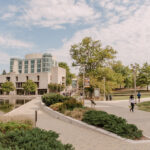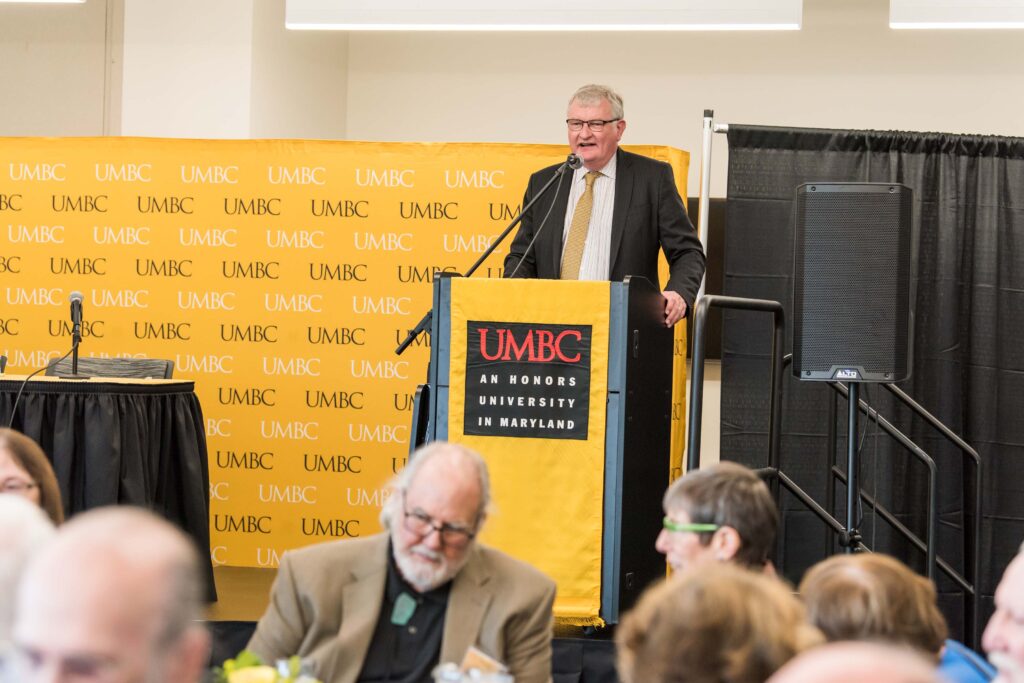
UMBC will expand its work boosting diversity in academia from Maryland to the national level through a new NSF INCLUDES Alliance: Re-Imagining STEM Equity Utilizing Postdoc Pathways (RISE UPP). The RISE UPP Alliance, anticipated to officially launch in fall 2022, is modeled after the AGEP PROMISE Academy, a high-impact initiative co-led by UMBC that supports faculty diversification in the biomedical sciences across University System of Maryland (USM) institutions.
The UMBC-led RISE UPP Alliance will assist the University of Texas System, Texas A&M University System, and University of North Carolina System in creating programs similar to the AGEP PROMISE Academy, but tailored to meet the needs of their specific institutions and systems. The AGEP PROMISE Academy focuses on recruiting diverse Ph.D. recipients and helping them develop their careers from the postdoc to tenure-track faculty stage. UMBC has received a $10 million grant from the National Science Foundation (NSF) to replicate this national model.
RISE UPP seeks to help R1, R2, and teaching-intensive institutions recruit and train postdoctoral scholars from underrepresented backgrounds in STEM, and help them build community and supportive networks, facilitating their progression into tenure-track positions.
“The underrepresentation of minoritized scholars in universities has been a stagnant problem for a really long time and decades of effort have not yet yielded much change,” said Robin Cresiski, assistant vice provost for graduate student development and postdoctoral affairs. “There is an appetite for trying something different.”
A systemic approach to faculty diversity
The AGEP PROMISE Academy, which launched in 2018 and is set to continue until 2023, is an extension of Maryland’s nationally-regarded PROMISE Alliance for Graduate Education and the Professoriate (PROMISE AGEP) program, also funded by NSF. UMBC co-leads the Academy with the University of Maryland, College Park, University of Maryland, Baltimore, Towson University, and Salisbury University.
Since its inception, 10 fellows have participated in the AGEP PROMISE Academy, including UMBC’s Nykia Walker, a biological sciences research assistant professor. Walker’s lab is focused on how primary breast tumors initiate metastases through transcriptional regulation.Walker is currently preparing for a tenure track position as one of UMBC’s Pre-Professoriate Fellows.
Cresiski, who also serves as the director of Maryland’s AGEP PROMISE Academy Alliance, explains that the Academy was developed as an extension of UMBC’s Fellows for Faculty Diversity program. UMBC developed that program to better recruit, support, and retain scholars committed to diversity, equity, and inclusion, particularly members of groups underrepresented in the professoriate.
As members of UMBC’s Executive Committee for the Recruitment, Retention and Advancement of Underrepresented Minority Faculty shared in a recent Baltimore Sun letter, “the program, launched in 2011, has been a resounding success.” In its first decade, the initiative brought in 18 postdoctoral fellows in disciplines from dance to history to geography and environmental systems, 17 of whom have transitioned to higher academic positions (11 at UMBC).
The success of the Fellows Faculty Diversity program, along with UMBC’s Natural Sciences Pre-Professoriate Fellowship program, served as the inspiration for the AGEP PROMISE Academy program, Cresiski notes. “We feel so fortunate that UMBC’s leadership has led us to generate approaches to addressing faculty diversity at a large scale,” she says.
The USM leading the way
In addition to the AGEP PROMISE Academy, other university systems will also be learning from additional RISE UPP Alliance partner, the University of California President’s Postdoctoral Fellowship Program.
Principal investigator Philip Rous, UMBC provost and senior vice president for academic affairs, shares that at its core RISE UPP is a research project that assesses the effectiveness of a university system-based approach to faculty diversification and allows participating systems to learn from one another.
 Philip Rous (Marlayna Demond ’11/UMBC)
Philip Rous (Marlayna Demond ’11/UMBC)
He underscores that by replicating USM’s approach within other university systems, more institutions across the country may also be able to increase the faculty diversity.
“Only by many systems and many universities doing this are we actually going to succeed in what we want to do, which is not only to change the diversity of our faculty but change the opportunities for diversity and inclusion of faculty across the nation,” says Rous. “All universities and all university systems have an obligation—and should, with our support—to diversify their faculty. Hopefully we can be useful to the other systems from our experience and help guide them.”
Rising up to the challenge
The RISE UPP Alliance will work with both participating university systems and their institutions and departments to make campus cultures and structures more inclusive.
In order to do this, RISE UPP will focus on four areas. The first will be supporting postdoctoral scholars from underrepresented groups by providing training, professional development, and community with other scholars across their university system and the RISE UPP Alliance network. RISE UPP will also facilitate formal assessment of participating departments, institutions, and systems to check if the adaptations are proving effective.
The Alliance will help the institutions create pathways, through policy and practice, that remove barriers for postdocs from underrepresented groups to access tenure-track positions within and across participating university systems. To make all this work possible, they will develop and support faculty who serve as mentors for postdoctoral fellows and junior colleagues through training, compensation, recognition, and advocacy.
“We have learned a lot about the benefits of working across the [USM] to develop, implement, study and evaluate our model that allows multiple pathways for postdocs to convert to tenure track faculty positions,” says Janet Rutledge, vice provost and dean of UMBC’s graduate school. “We look forward to further development, dissemination and further evaluation and research with additional state system partners to expand opportunities for postdoc conversions.”